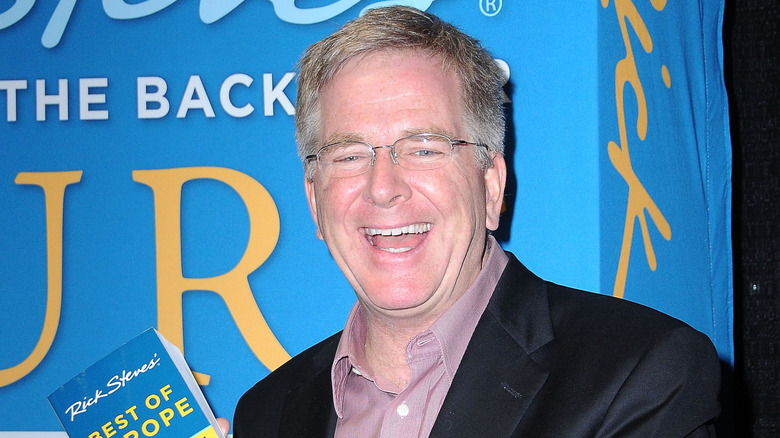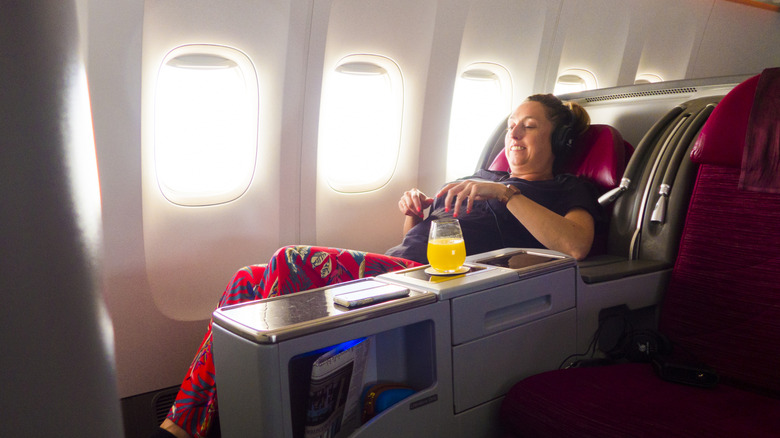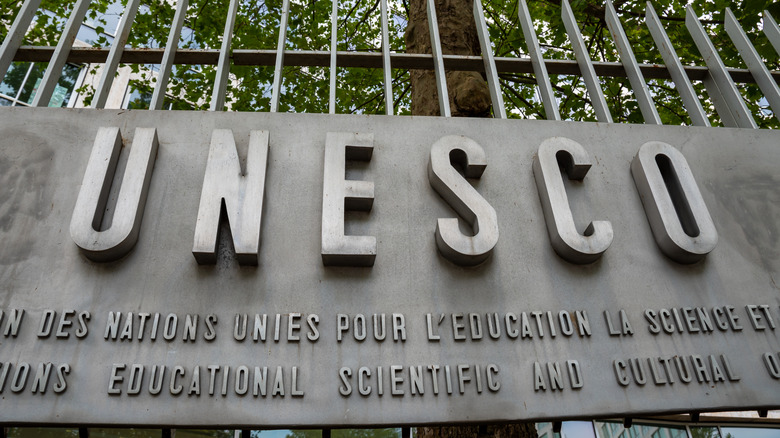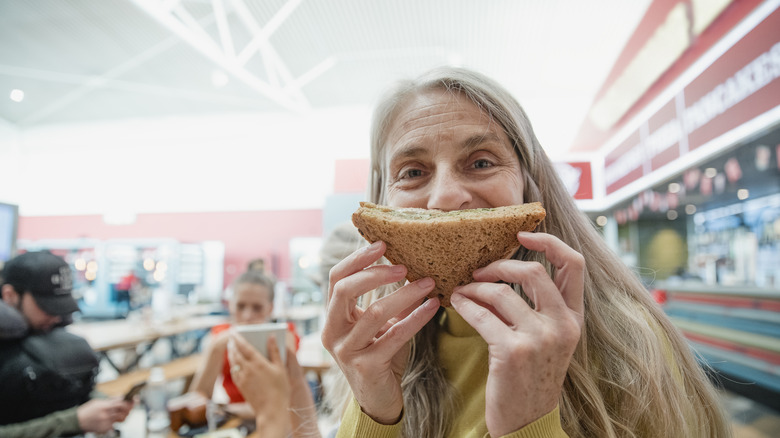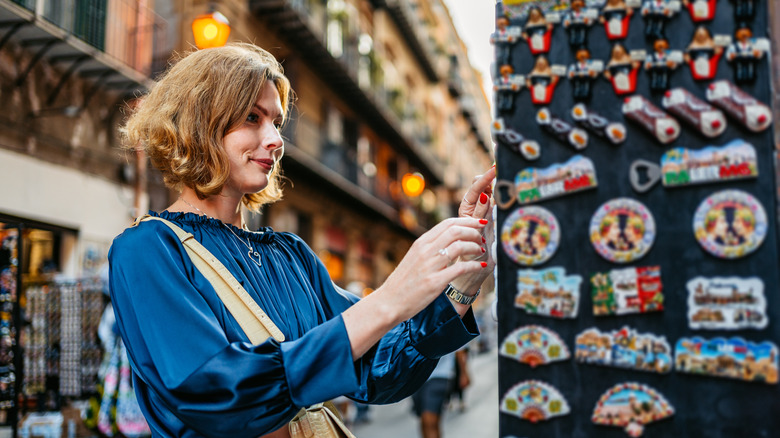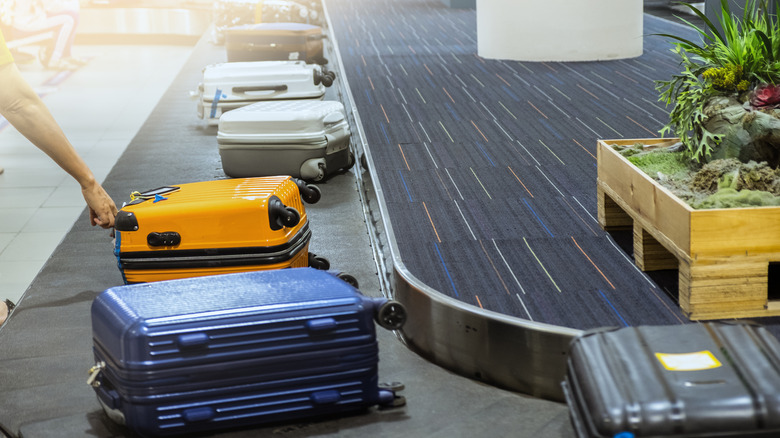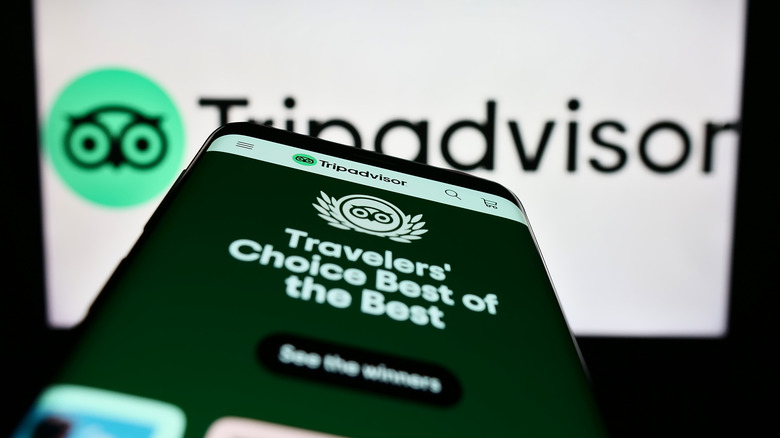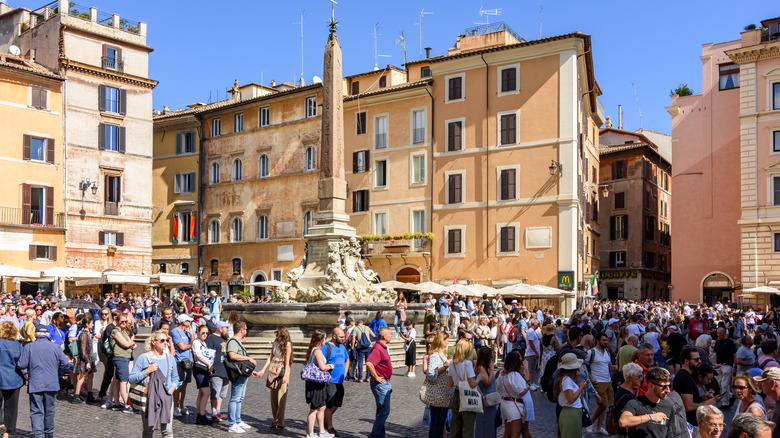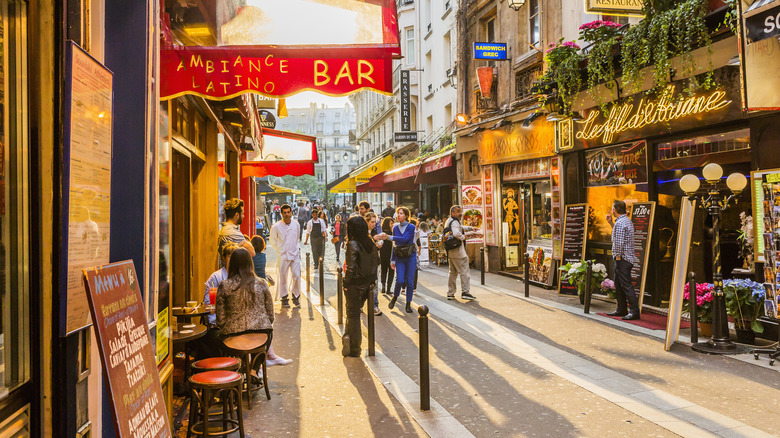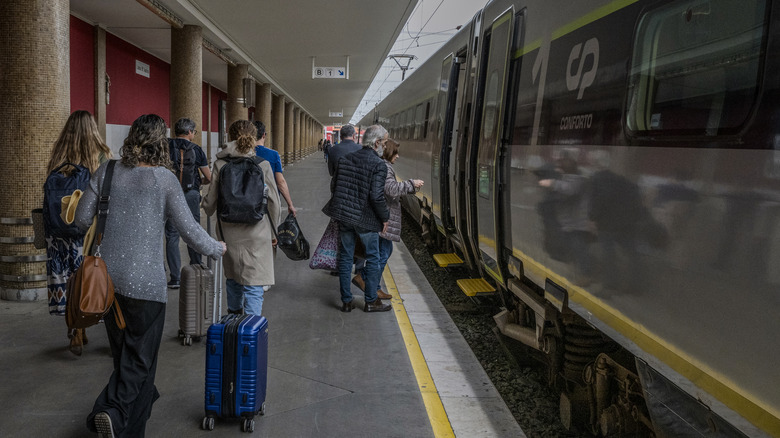12 Things Rick Steves Refuses To Buy While Traveling
Travel enthusiast Rick Steves knows a thing or two about flying over to Europe. He's been hooked on the continent for 50 years and built his work life around the allure of the place. Of course, Steves travels to many other countries and continents, and has been all over the world. Even as a Europhile with a thriving tour brand focused on the continent, his favorite destination is actually India. No matter where Steves jets off to on an adventure, he's a consistent packer with some hard rules he always follows. This helps him tailor his trip to a specific set of guidelines that have served him well over his decades of exploration.
In addition to a packing list that rarely deviates from a set framework, Steves is also a proponent of economical choices and sustainable travel. He's outspoken about his preference for community spaces and businesses, and refuses to spend his money on certain purchases in the build up to a vacation and during his travels. These areas can easily trip up a traveler and inflate the cost of their holiday, sometimes astronomically. For Steves, the choice to forego these kinds of purchases is one that makes financial sense, but it also helps him craft a memorable vacation with far more good than mediocre or bad to look back on when it's over.
Flight upgrades
Rick Steves enjoys a net worth of roughly $15 million, per Celebrity Net Worth, placing him in the same realm as many prominent B-list celebrities. With this much financial mobility and a business specifically related to travel that brings in revenues of about $120 million every year, it's perhaps surprising that Steves refuses to pay for flight upgrades. The typical first class flyer makes over $150,000 annually, and Steves absolutely fits this mold. However, his stance against this practice isn't just a financial one. Steves told The Washington Post in 2024: "It never occurred to me I'm suffering, as long as I've got an aisle and a seat that reclines, I'm happy."
Flight upgrades can easily run a traveler hundreds or even thousands over the same journey in an economy class seat. This makes it a frequently frivolous add on. For Steves, there's another cost to this choice. He has always been a conscientious traveler, Focused intensely on his carbon footprint. His travel business brings tens of thousands of people from North America to Europe annually; and he donates $30 per traveler (an estimate of the carbon cost for each tourist) to sustainability projects both at home and abroad as a self-imposed carbon offset tax to balance this burden. In addition, Steves is on the record suggesting that he believes airplanes should only offer a single, economy class rather than selling this upgrade at all.
Tickets to see UNESCO World Heritage Sites
UNESCO World Heritage Sites can be found all over the world. They're designated by the UN as important places that speak to the history of humanity. There are many sites under this umbrella that get rave reviews from visitors and plenty of travel sites and guides feature them prominently in their outlines of global vacation destinations. Rick Steves does things a little differently. He hasn't included any UNESCO World Heritage Sites in any of his guidebooks. It's actually a personal rule of his to avoid their inclusion. He feels that it's somewhat counter to his sensibilities to highlight these kinds of heavily popularized tourist spots.
In addition to leaving them out of his guidebooks, Steves also notes that he frequently finds these tourist draws underwhelming. They are often more expensive than other, similar tourist attractions, and because of their designation they frequently experience higher volumes of traffic from visitors. Skipping these additions to an itinerary can help save money and time for a traveler looking uncover their own highlights.
Meals at Michelin-star restaurants
Fancy meals are well within Rick Steves' financial abilities. However, he tends to avoid these kinds of splurges for a few important reasons. For one thing, he doesn't see major value in spending his money on these kinds restaurant expenses. There are numerous ways to waste your money at restaurants, and Steves is certainly mindful of this fact. But he also prefers to rough it a bit and find hidden, local gems for his nourishment needs, even if that means the luxury or aesthetic value takes a back seat. He's a generally frugal spender who prefers budget-friendly meals that are steeped in cultural relevance. This allows him to get great value out of his choices in both the financial sense and as a means to more fully explore the place he's visiting.
Steves is also particularly fond of cobbling together a meal from locally sourced Ingredients. He enjoys walking around markets and picking up a few fruits and vegetables that don't require any preparation in the kitchen in order to eat. Combined with some fresh bread or a pastry from a bakery serving locally produced goods and a bit of meat or cheese to round out the meal, he gets a taste of the local flavors while sticking to a carefully designed budget that anyone can follow.
Kiosk sandwiches at airports and train stations
Cheap food isn't all created the same, however. There are lots of quick eats that Rick Steves avoids in his travels, and one that he has highlighted in the past involves the kiosk stalls found at airports, train stations, and other transit points. Sandwiches, in particular, he has found to be uniquely misleading. Sandwiches in kiosk shops have a tendency to feature overflowing meat and vegetable offerings around the edges. This leads buyers to think that the product is going to be a filling choice. Once purchased, he notes, you'll often quickly find that there's actually little substance further into the sandwich.
In his mind, these are all too often visual tricks that vendors rely on to overcharge customers. This will leave you with less money in your wallet while still suffering from a rumbling stomach. He opts to avoid these kinds of purchases because they only serve to aggravate travelers while setting their budget back a few extra ticks.
Pricey souvenirs (and most others, for that matter)
Rick Steves isn't a big souvenir purchaser. He doesn't focus much on them at all, and instead looks to make memories while exploring a new, or even familiar landscape. If he is going to buy a souvenir, he tends to focus on inexpensive mementos that offer a connection to a particular memory in the place he's visiting. He suggests that travelers are too quick to get wrapped up in the souvenir game, ultimately spending too much time contemplating their options in souvenir shops rather than enjoying their vacation to its fullest.
Of course, there are some financial elements to this choice, too. Steves notes that in many cases the bulk of trinkets and souvenirs you'll find in tourist-centric shops and stalls are not locally produced. As a result, this is overwhelmingly meaningless junk that has been shipped in from cheap factories elsewhere. If you have your eye on something that reminds you of your time in this place there's no reason not to purchase it. However, he is a big proponent of seeking out local sellers whose stock is sustainably produced and sourced instead of a run-of-the-mill souvenir shop. As well, He sees little value in purchasing any kind of souvenir that's particularly expensive. These are meant to be reminders of your time in this place rather than big purchasing decisions that eat away at your travel budget or might sit on your credit card statement and threaten to introduce added interest.
Large suitcases and checked baggage fees
Rick Steves is adamant about packing light. He only travels with carry on baggage, and specifically packs only what he can reasonably carry while out and about in his destination. Steves does suggest that train station and other transit storage lockers can be a valuable tool for travelers exploring a city for a day on their way between primary stops. But travelers can't always rely on these kinds of amenities being available along their route. As a result, this commitment to only packing what he can realistically haul on his back allows him to go with the flow and let the adventure take him along for the ride.
It's undeniable that a commitment to not overpacking is also a big financial boost, particularly for those who are traveling on a tighter budget. Airlines across the world have continuously increased the price for all kinds of services involved in travel, including things like baggage insurance, another expense that Steves highlights as worthless. Baggage itself has become a major sticking point. Both larger carry on items and checked bags have become chargeable additions and increasingly expensive. You'll get little included in the price of your ticket, these days, and Steves' choice to pack light is also a valuable financial boost that can help you save more of your money for the experiences you'll be looking to take in when you land.
Just about anything from stores and restaurants classed as 'No. 1' on review sites
Rick Steves is a traveler who actively and aggressively seeks out local vendors and mom-and-pop shops. He isn't one to get sucked in by hype or reviews, and in fact he frequently avoids any kind of attraction, restaurant, or store that is listed on review sites as the number one option for anything. In his mind, this designation doesn't come from genuine appreciation for the vendor but rather an aggressive push at marketing used to propel the business up to the top of the rankings list. As is the case with any marketing campaign, more visibility equals more sales and so he sees these kinds of rankings not as a genuine reflection on the value that can be found at the establishment but rather a business tactic. This means that these kinds of places are more likely to be busy and feature heightened prices while not necessarily providing the value and authenticity that they might tout in their efforts to drive an increase in customer visits.
Instead, he looks for establishments off the beaten path. These kinds of local gems are often less expensive, provide a better service, and are uniquely authentic in ways that other, commercially-driven establishments can't typically match. Steves has had lots of success in approaching his selection process in this way. The results tend to see him saving money, enjoying his experience more, And making lasting memories on a routine basis.
He also tends to avoid paying for 'must-see' attractions
There are a few types of attractions that Rick Steves frequently looks to avoid. Of course, he advocates for certain essentials like the Eiffel Tower in Paris or the Anne Frank House in Amsterdam, both of which require some additional planning in order to work around crowds and ticketing needs. But the majority of must-see attractions and sites are frequently left off of Steves' to do list when visiting a new place or bringing a tour group somewhere. He views these as wasteful in both time and money. In many instances, must-see spots are excessively pricey for what you're getting. He has found through decades of travel that in almost all cases you'll be able to find a similar town, museum, or outdoor environment that's cheaper or even free and features far less crowding. As is the case with many other elements of the tourism industry, He views the must-see thing as advertising hype rather than genuine interest.
By forging your own path and looking for alternatives, Steves notes that travelers can experience more of the community while limiting their wait times and keeping more money in their pocket. This can make for a much more enriching trip for a variety of reasons.
He brings toiletries along for the journey rather than buying them
Toiletries are a packing item that get a lot of back and forth. Some travelers find value in leaving them out of their suitcase and buying the things they need when they arrive in their destination. Essentially, this is a trade of space for time, and of course money. If you're purchasing toiletries in your destination, there's a good chance you'll pay a premium to get the same items you're familiar with back home. This is especially true if you buy toiletries in airport retail locations rather than heading out into the city before making your purchase. Rick Steves is firmly on the other side of this conversation. He brings his toiletries with him for a variety of reasons including the price discrepancy.
In his mind the time spent hunting down toothpaste, deodorant, and other essentials could be better used to explore the vast tapestry of the city or town he has landed in. It can also be exceedingly frustrating to have your first purchase in a new and exciting landscape be something banal like a toothbrush or sunscreen. The risk of not finding what you're looking for is also integrated into this approach. Even though you'll sacrifice a little bit of space in your bag, the financial and time savings you enjoy by bringing along the staples you require before heading to bed or heading out the door in the morning is significant.
Expensive clothing items (both ahead of a trip and during an adventure)
Plenty of travelers start spending against their holiday budget before making it out the door. If you have invested in a range of new clothing items before traveling you are limiting yourself, according to Rick Steves. Naturally, Steves is a proponent of simple packing both in the size and the type of bag you bring along and in the clothing items you choose to wear while experiencing your grand adventure. He rarely invests in new pieces of clothing before heading away, unless there's a need to replace something like a coat ahead of a winter adventure. He opts for simple clothing staples because they're easy to pack and won't introduce added decision making into your days away.
By packing simply, you take out the headache of trying to figure out what to wear on a daily basis. This might not seem like a major point of contention, but dressing in comfortable and subtle threads allows you to focus all of your attention on the journey rather than lamenting over the clothing item you didn't bring or seeking out new purchases while on vacation. As well, the savings you'll enjoy by not indulging numerous extra purchases before your flight can be significant. Project Cece reports the average piece of clothing is worn just seven times. It's entirely possible that clothing purchases you make before a trip will only last for that single vacation before being thrown away or shuffled to the back of your wardrobe.
Meals at restaurants with multi-language menus
Rick Steves has a habit of being a little picky with the restaurants he frequents while abroad. However, he isn't selective in the way that most people would assume. He doesn't splurge on the fancy meals, and he tries his best to avoid the type of restaurant you'll find in tourist centers. Everyone who has been abroad will know the look and feel right away. These are the restaurants that feature a person out front trying to entice people walking past to come and sit down at a table. They will flaunt menus with large pictures on them and have offerings in multiple languages. These kinds of restaurants are there to serve the tourist marketplace as ostensibly authentic local establishments. Steves looks to avoid these because they don't serve his purpose of getting to know the local community in a more genuine way.
It should also be noted that these kinds of restaurants tend to offer subpar dishes when it comes to flavors and preparation. They are frequently looking for volume above quality, and in many cases you'll pay more for this kind of experience than you would for an authentic meal at an establishment just around the corner from these kinds of centrally located tourist havens. Steves avoids them because the value they deliver is lacking in many ways, financially and otherwise.
Additional nights in a hotel room when an overnight train is available
The overnight train is one of Rick Steves' favorite travel tricks. If your itinerary sees you jumping from city to city or country to country while abroad, it's entirely possible that you can save a serious dime by not booking an additional night in your hotel. Instead of staying the night in one location and then hopping on the train or catching a flight the next morning, opting for the overnight train allows you to catch up on your sleep at the appropriate time while moving to your next adventure, simultaneously. Overnight trains aren't usually more expensive than a standard train voyage, and so they have the added benefit of saving the entirety of the cost to stay in a hotel the night before you're slated to travel. This can be a huge boost to your budget.
In addition to the financial value that overnight trains bring to the table, they also save an enormous amount of time. Many travelers won't be committing the same kind of length to their adventure that Steves has been able to provide for himself. He tends to spend around three months every year in Europe. The average American traveler might only go for a week, at most. Therefore, every day is crucially important. Instead of wasting a day sitting on a train, sleeping as you move from one exciting destination to the next saves you many hours that would have otherwise been lost to a travel day. The value swing is therefore immense.
